|
|
|
Sort Order |
|
|
|
Items / Page
|
|
|
|
|
|
|
| Srl | Item |
| 1 |
ID:
120157
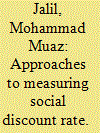

|
|
|
| 2 |
ID:
173005
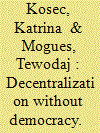

|
|
|
|
|
| Summary/Abstract |
Increasingly, decentralization is being adopted by countries in which assumptions made by formal models of decentralization, such as electoral accountability and population mobility, fail to hold. How does decentralization affect public service delivery in such contexts? The authors exploit the partial rollout of decentralization in the autocratic context of Ethiopia and use a spatial regression discontinuity design to identify its effects. Decentralization improves delivery of productive services, specifically, agricultural services, but has no effect on social services, specifically, drinking water services. This finding is consistent with a model in which local leaders have superior information about the public investments that will deliver the greatest returns and they are incentivized by decentralization to maximize citizens’ production—on which rents depend—rather than citizens’ utility. These findings shed light on nonelectoral mechanisms through which decentralization affects public goods provision and help to explain decentralization’s mixed effects in many nondemocratic settings.
|
|
|
|
|
|
|
|
|
|
|
|
|
|
|
|
| 3 |
ID:
094982
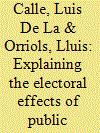

|
|
|
|
|
| Publication |
2010.
|
| Summary/Abstract |
According to the literature, governments have strong incentives to use the public budget tactically in order to either obtain the electoral support of new voters or strengthen the loyalty of their traditional supporters. Yet vote-seeking strategies only become rational when voters follow their self-interest and reward governments when their constituency benefits from public transfers. The literature has focused on the governments' incentives, largely ignoring the importance of knowing whether the electorate is responsive to public investments. This study tests empirically whether incumbents strategically use public investments to gather more electoral support; and whether voters take these investments into account at the polls. These two questions are pursued simultaneously by using as a case study the expansion of the underground network in Madrid, Spain. Only a little evidence is found to support the idea that regional governments constructed new metro stations in neighbourhoods where they had more to gain electorally. Also, the inauguration timing strictly followed the electoral cycle, something that indicates a strategic calculus on the part of the incumbent. However, the models are also consistent with the idea that the government's investments were primarily driven by motives of efficiency. Indeed, although governments are tempted to follow vote-seeking strategies, they are also aware that they cannot deviate too much from an efficiency-based allocation of public resources. From the perspective of the voters, robust evidence has been found to show that regional voters rewarded this policy at the neighbourhood level. Neighbourhoods that received new metro stations voted in higher numbers for the incumbent than those quarters without new investments. All in all, these findings may have some implications for normative democratic theory.
|
|
|
|
|
|
|
|
|
|
|
|
|
|
|
|
| 4 |
ID:
043172


|
|
|
|
|
| Publication |
London, 1969.
|
| Description |
xxxiii, 561p.
|
| Series |
Studies in comparative economics
|
|
|
|
|
|
|
|
|
|
|
|
Copies: C:1/I:0,R:0,Q:0
Circulation
| Accession# | Call# | Current Location | Status | Policy | Location |
| 004039 | 332.042/GOL 004039 | Main | On Shelf | General | |
|
|
|
|
| 5 |
ID:
133437
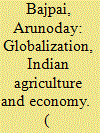

|
|
|
|
|
| Publication |
2014.
|
| Summary/Abstract |
Globalization is a buzz world today. In its present form, it has dominated academic discourse and the minds of policy makers since the early 1990s. it has many dimensions-economic, political, social and cultural- enforcing and sustaining each other. The ongoing from of globalization, anchored to the ideology of neo-liberalism, is a comprehensive process touching all aspect of human lives. Globalization may be viewed both as an end product as well as a process. The consequential essence of all dimensions of globalization in the increased access to global platform, facilitated by modern means of communication technology, resulting in increased among peoples and nations.
|
|
|
|
|
|
|
|
|
|
|
|
|
|
|
|
| 6 |
ID:
140178
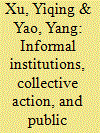

|
|
|
|
|
| Summary/Abstract |
Do informal institutions, rules, and norms created and enforced by social groups promote good local governance in environments of weak democratic or bureaucratic institutions? This question is difficult to answer because of challenges in defining and measuring informal institutions and identifying their causal effects. In the article, we investigate the effect of lineage groups, one of the most important vehicles of informal institutions in rural China, on local public goods expenditure. Using a panel dataset of 220 Chinese villages from 1986 to 2005, we find that village leaders from the two largest family clans in a village increased local public investment considerably. This association is stronger when the clans appeared to be more cohesive. We also find that clans helped local leaders overcome the collective action problem of financing public goods, but there is little evidence suggesting that they held local leaders accountable.
|
|
|
|
|
|
|
|
|
|
|
|
|
|
|
|
| 7 |
ID:
119181


|
|
|
|
|
| Publication |
2012.
|
| Summary/Abstract |
In contrast to its decentralized political economy model of the 1980s, China took a surprising turn towards recentralization in the mid-1990s. Its fiscal centralization, starting with the 1994 tax reforms, is well known, but political recentralization also has been under way to control cadres directly at township and village levels. Little-noticed measures designed to tighten administrative and fiscal regulation began to be implemented during approximately the same period in the mid-1990s. Over time these measures have succeeded in hollowing out the power of village and township cadres. The increasing reach of the central state is the direct result of explicit state policies that have taken power over economic resources that were once under the control of village and township cadres. This article examines the broad shift towards recentralization by examining the fiscal and political consequences of these policies at the village and township levels. Evidence for this shift comes from new survey data on village-level investments, administrative regulation and fiscal oversight, as well as township-level fiscal revenues, expenditures, transfers (between counties and townships) and public-goods investments.
|
|
|
|
|
|
|
|
|
|
|
|
|
|
|
|
| 8 |
ID:
089563


|
|
|
|
|
| Publication |
2009.
|
| Summary/Abstract |
This study uses a unique set of annual provincial data on soil and water conservation (SWC) investments during the period 1989-2005 to estimate the impact of such investments on the extent and severity of erosion, the growth rate of agricultural gross domestic product (GDP) and rural poverty reduction in China. We find that SWC investments made by local governments have a significant negative impact on the extent of erosion and (in recent years) the severity of erosion, whereas SWC investments made by farm households until recently had a significant negative effect on the severity of erosion. In its turn, the severity of erosion is found to have a significant negative impact on agricultural GDP. Estimation of the impact of the extent of erosion on agricultural GDP provides mixed results. Based on these results, we derive that one RMB invested in SWC by local governments increases agricultural GDP in 2002 with 0.84-1.25 RMB. Finally, we find that agricultural GDP has a significant negative impact on the rural poverty rate. The resulting indirect effect of SWC investment on rural poverty reduction, however, is small compared to other types of public investment. We conclude that (local) government investments in SWC do not only serve environmental goals, but also make a non-negligible contribution to agricultural growth and rural poverty reduction.
|
|
|
|
|
|
|
|
|
|
|
|
|
|
|
|
| 9 |
ID:
120082
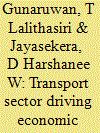

|
|
|
|
|
| Publication |
2012.
|
| Summary/Abstract |
An expectation to double the per capita income in five years through a sustained GDP growth rate of 9 per cent could only hold ground under very favourable economic conditions. On the one hand, this projected acceleration of economic activity, if practically realized, would demand a substantial amount of investment expenditure which could cause a widening of resource gap leading the economy into a debt trap. On the other hand, if the service sector including the transport sector could not augment to meet up the investments and expected output expansions, the targeted growth itself could be at risk. Neither scenario would be favourable. A way out of this apparent impasse is to increase investment productivity-by way of being observant in capital spending and improving the trickle-down effect of investment expenditure against mere capital accumulation.
|
|
|
|
|
|
|
|
|
|
|
|
|
|
|
|
|
|
|
|
|